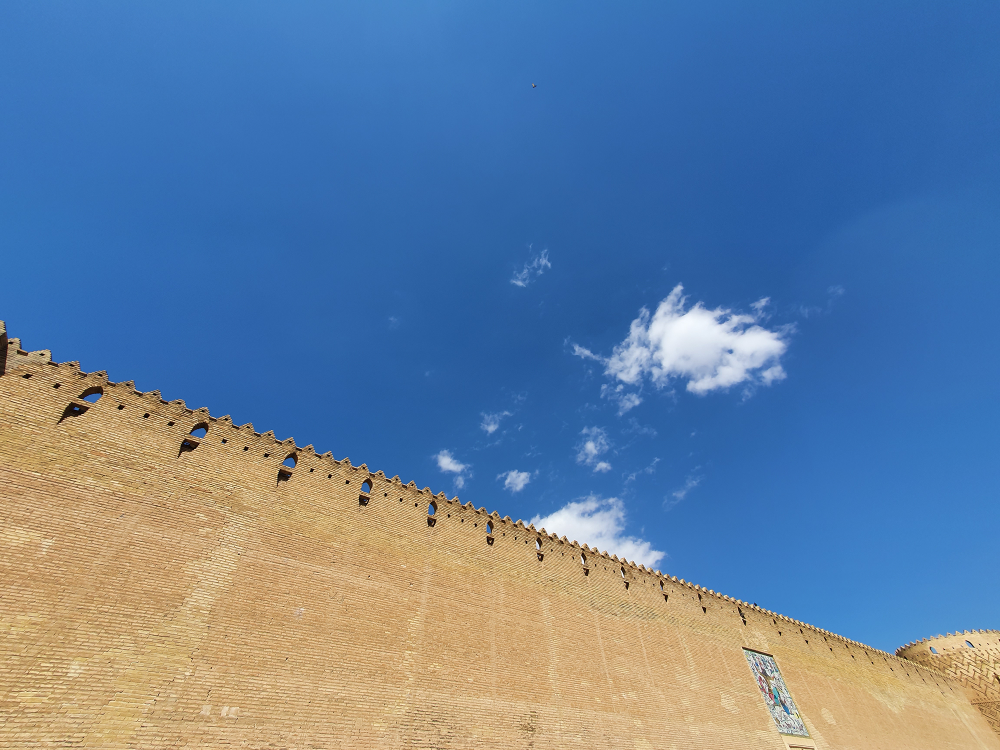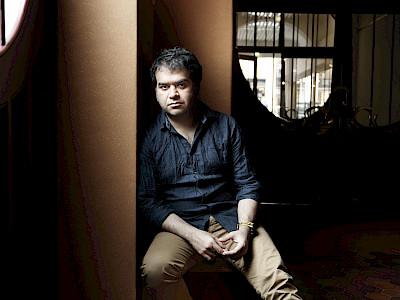16 — 20.05.2023
A man wrote on his Instagram account that he and his wife, who is currently in jail as a political prisoner, promised each other to run each night on either side of the prison’s wall. In the months before her arrest, they had been training to run as part of a plan to leave Iran and reach England. They prepared to cover the 27 km stretch of the Channel Tunnel at the only possible moment, the five hours between the last train of the night and the first one of the morning. But when his wife was arrested a week before their departure, this training for a new life was interrupted. Amir Reza Koohestani uses the story of their long-distance training on both sides of the wall as a starting point to reflect on contemporary Iranian society. It's a run that continues despite everything. We see a woman and a man on stage. In a precise interlocking mechanism, their breathless dialogues intersect with their interior monologues where classical Persian poetry echoes all possible transactions in the darkness of a night. Koohestani has familiarised past festival audiences with his powerful and poetic performances. With this project – rehearsed with his company in Tehran over the past months, and premiering now at the festival – he pierces the darkness with a dialogue on his country’s present.
Blind Runner
1
In the winter of 2009 in Iran, after the Green Movement had subsided after the government’s response to the demonstrators was to fire bullets, people gradually despaired of the possibility of achieving change in the country’s political system and crawled back from the street to the corner of their sofa, I started running. For me, running was an alternative to the demonstrations that were no longer being held and the freedom that had left us again for the umpteenth time. To escape from the image of police officers and the smell of tear gas that were stored in my memory, I ran on a road where, behind the metal fences, you could see the emerging class of new money who had made a living circumventing western sanctions; they clumsily played golf with imported non-standard golf clubs on artificial grass during their idle hours.
My decision to run was sudden, unprepared, with no trainer. I couldn’t even wait to warm up. Just like an alcoholic who drinks his beer right in front of the supermarket, I was so impatient to step onto the road which was giving me an illusion of liberation. I didn’t even give myself a chance to warm up. For this reason, life with this newly found pleasure ended very quickly; after a few times, the muscles in the back of my leg suddenly cramped and the orthopaedic doctor banned me from running indefinitely.
2
Freedom is a state, just like running; you set yourself an imaginary goal of moving from point A to point B, for example, but your goal is not to physically move, but rather to experience the freedom in between; that’s how it was for me. It wasn’t the record that mattered nor the distance. I ran until I couldn’t anymore. I ran until I was out of breath, until one of my leg muscles or my heart sounded the alarm; I didn’t even stop there. I said to myself to go another hundred steps. Are you still alive? You can still do it, another one hundred steps. It’s not surprising that in such a wrong way I did such damage to my body, a kind of self-revenge after the disappointment of the revolution.
3
But why the blind runner? Samaneh Ahmadian, the drama-turge for this performance, first showed me the photo of the blind runners next to their guides at the Paralympic Games in Tokyo. Two bodies with their hands tied together, one blindfolded and the other with their eyes wide open, are running with all their might. Seeing those photos, something stirred in me. This time, running, which has always been an image of freedom for me, found a better way to round off the definition of freedom. As for a blind person with his or her guide runner, freedom is collective. You can’t be free when you are alone. In the crowd’s presence, freedom and the struggle for it gain meaning.
4
In September 2022, Niloofar Hamedi was the first journalist to report on the hospitalisation and eventual death of Mahsa Amini due to a beating by the Morality police. A report that triggered the social uprising of Woman Life Freedom. Niloofar Hamedi was arrested a few days after her report came out and is still in prison without trial. She and her husband, who is also a marathon runner, launched various campaigns to bring the voices of political prisoners to the public’s ears, such as Nilofar announcing that she would perform a sun salutation from her cell at 8 am every morning or would run twice a week in slippers in the prison yard. Her husband also turned running outside the prison into a campaign for Niloofar’s release. To this day, numerous runners have run for Niloofar’s liberation in different marathons.
5
Zia Nabavi, a political prisoner who spent eight years of his youth in one of the Islamic Republic’s prisons, wrote his master’s thesis on “The phenomenology of the prison experience”. To write this thesis, he interviewed tens of political prisoners, which was very enlightening for someone like me who knew nothing more than what has been published in social media. In the introduction to his thesis, Nabavi writes: “The approach of position media on prison is built around the concepts of ‘rehabilitation’ and ‘punishment’, and the approach of opposition media also frames the issue of prison with the concepts of ‘torture’ and ‘repression’, and therefore both of them are largely blind to the real experience of prison.” He claims that the dominance of these two political approaches in the public media has caused the experience of prison to be very surprising and unfamiliar for someone who’s involved with this experience for the first time. “Contrary to popu-lar opinion, prison is not a place without any sign of life, but a unique and different quality of life flows in it, which cannot be understood with the political glasses that we have chosen to look at it through.” Reading this three-hundred-page research was a gift for someone who wants an artistic, humanistic approach towards political prisoners. I owe Zia Nabavi more than just a bottle of wine.
6
Immigrants are either fleeing from dictators who are puppets of world powers or fleeing from poverty resulting from centuries of their property being looted by colonia-lists. Yet Europeans are unwilling to accept responsibility for destabilising these people’s lives by doing their best to push them back to their destabilized countries. (Just read again The Illegal Migration Bill that had its readings in the House of Commons in Britain last March: anyone who arrives ‘illegally’ will be unable to claim asylum, and the Home Secretary will have a duty to remove them.) As a result, there is no other option for the immigrant except to step on dangerous paths, such as going through the tunnel that has trains travelling at a speed of 160 kph every few hours. If they can’t cover the 38-kilometre distance before the Paris-London high-speed train passes through, all that will remain is their blood stains on the wall.
- Amir Reza Koohestani
- April 2023
Presentation: Kunstenfestivaldesarts, Théâtre Les Tanneurs
Text and direction: Amir Reza Koohestani | Dramaturgy: Samaneh Ahmadian | Director’s assistant: Dariush Faezi | Lights and scenography: Éric Soyer | Video: Yasi Moradi, Benjamin Krieg | Music: Phillip Hohenwarter, Matthias Peyker | Costume design: Negar Nobakht Foghani | Performers: Ainaz Azarhoush, Mohammad Reza Hosseinzadeh | French and English translations and surtitles adaptation: Massoumeh Lahidji | Dutch translation: Werkhuis / Erik Borgman | Surtitles operator: Negar Nobakht Foghani | Production, administration and diffusion: Pierre Reis / Bureau Formart | Logistics and communication assistant: Yuka Dupleix / Bureau Formart
Production: Mehr Theatre Group | Coproduction: Kunstenfestivaldesarts, Berliner Festspiele, Athens Epidaurus Festival, Festival d’Automne à Paris, Théâtre de la Bastille, La rose des vents – scène nationale Lille Métropole, La Vignette – scène conventionnée Paul-Valéry Montpellier, Théâtre populaire romand – Centre neuchâtelois des arts vivants, Triennale Milano Teatro, Festival delle Colline Torinesi/Fondazione TPE, Noorderzon Festival of Performing Arts & Society
Residencies: Théâtre populaire romand – Centre neuchâtelois des arts vivants, KWP Kunstenwerkplaats, Théâtre Les Tanneurs
With the support of Ministry of Culture – Regional Directorate for Culture in Île-de-France and the French Institut


